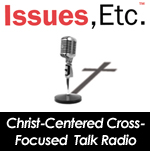What role does church and government have together? The ‘right’, it appears, says, “Much.” (http://www.religionnews.com/index.php?/rnstext/beck_wants_to_lead_but_will_evangelicals_follow/). The left might say little (but for their ideologies and the like-separation of church and state; Christianity, however, is off-limits, but not Islam, Atheism, and other -isms).
But when we look at Scripture, we find that the government has one role, the church another. The government is to establish external peace. It does this by making and enforcing laws, punishing the evil-doer, etc. (Romans 13). The government is not to meddle in the preaching and teaching of the church, regulating her in her doctrine.
The church, on the other hand, does not have the authority to use force. She has the authority of the Word, to preach and to teach, for forgive sins and to retain sins (Matthew 18:18; John 20:23).
The following is from The Book of Concord, Tappert edition:
5 Our teachers assert that according to the Gospel the power of keys or the power of bishops is a power and command of God to preach the Gospel, to forgive and retain sins, and to administer and distribute the sacraments. 6 For Christ sent out the apostles with this command, “As the Father has sent me, even so I send you. Receive the Holy Spirit. If you forgive the sins of any, they are forgiven; if you retain the sins of any, they are retained” (John 20:21-23).
8 This power of keys or of bishops is used and exercised only by teaching and preaching the Word of God and by administering the sacraments (to many persons or to individuals, depending on one’s calling). In this way are imparted no bodily but eternal things and gifts, namely, eternal righteousness, the Holy Spirit, and eternal life. 9 These gifts cannot be obtained except through the office of preaching and of administering the holy sacraments, for St. Paul says, “The gospel is the power of God for salvation to everyone who has faith.”2 10 Inasmuch as the power of the church or of bishops bestows eternal gifts and is used and exercised only through the office of preaching, it does not interfere at all with government or temporal authority. 11 Temporal authority is concerned with matters altogether different from the Gospel. Temporal power does not protect the soul, but with the sword and physical penalties it protects body and goods from the power of others.
12 Therefore, the two authorities, the spiritual and the temporal, are not to be mingled or confused, for the spiritual power has its commission to preach the Gospel and administer the sacraments. 13 Hence it should not invade the function of the other, should not set up and depose kings, should not annul temporal laws or undermine obedience to government, should not make or prescribe to the temporal power laws concerning worldly matters. 14 Christ himself said, “My kingship is not of this world,”3 and again, 15 “Who made me a judge or divider over you?”4 16 Paul also wrote in Phil. 3:20, “Our commonwealth is in heaven,” 17 and in 2 Cor. 10:4, 5, “The weapons of our warfare are not worldly but have divine power to destroy strongholds and every proud obstacle to the knowledge of God.”
18 Thus our teachers distinguish the two authorities and the functions of the two powers, directing that both be held in honor as the highest gifts of God on earth. (Augsburg Confession, XXVIII. The Power of Bishops, para. 5-18)
—
Christians and nonChristians can (and do) come together for policies and practices in society. This can and does include different religious groups. But agreeing on governmental policy and the like is a far different cry from unity in teaching. There might be some parallels between the Christian faith and others, but that’s also where the similarities end. Only the Christian faith teaches the true and only way to eternal life—through Christ (John 14:6). All others teach works and keeping the Law for salvation.
The Christian is to distinguish between truth and error. The Christian is also to distinguish between the affairs of the church and the affairs of the state. The government and society are not the means for saving the world, nor the pulpit from which the church is to preach. Nor is the church the means for electing one candidate or another. She is to proclaim God’s Word, courageously and in truth (2 Timothy 4:2). Where there is a mixing of Church and State, problems ensue.
2 Rom. 1:16.
3 John 18:38
4 Luke 12:14
Filed under: The Doctrine of Two Kingdoms, Church & State | Tagged: AC, atheism, Augsburg Confession, Christ, Christianity, church, Doctrine, Glenn Beck, Government, Islam, rally, religion, savior, society, state, teaching, Tolerance, world | Leave a comment »









